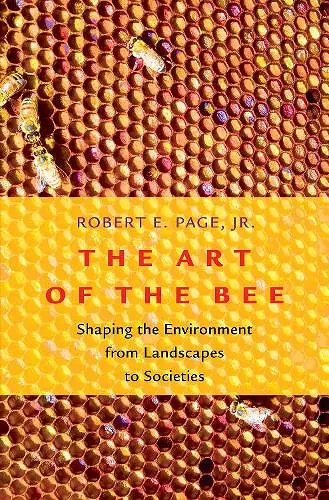The Art of the Bee
Shaping the Environment from Landscapes to Societies
Format:Hardback
Publisher:Oxford University Press Inc
Published:17th Sep '20
Should be back in stock very soon

This insightful work explores the connections between bees and humans, revealing parallels in social structures and evolutionary history. The Art of the Bee offers a unique perspective on these relationships.
In The Art of the Bee, Robert E. Page, Jr. presents a fascinating exploration of the intricate relationships between bees and humans through a blend of biological, sociological, and philosophical perspectives. The book highlights the immense impact bees have on our world, particularly their role in the evolution of diverse flowering plants. Through their pollination activities, bees have not only shaped our landscapes but also played a crucial role in the development of various ecosystems, influencing countless species of plants, animals, and microbes.
Page delves into the evolutionary history and social structures of bees, offering insights that challenge traditional approaches to biological knowledge. Instead of presenting information in a layered format, The Art of the Bee weaves together fundamental biological concepts with engaging themes, encouraging readers to explore and understand the complex dynamics at play. By employing the social contract as a framework, Page examines the sophisticated social systems of bee colonies, which have been honed over millions of years of evolution.
The book also investigates the coevolution of bees and flowering plants, the honey bee as a superorganism, and the unique mating behaviors of the queen. Ultimately, The Art of the Bee reveals striking parallels between human societies and bee communities, emphasizing that these similarities stem from shared principles of political philosophy rather than a common genetic heritage.
[I] recommend this wonderful volume unreservedly to students of bee biology, naturalists, gardeners, and anyone with a desire to know more about the fascinating world of honey bees. * Stephen L. Buchmann, University of Arizona, Arizona, The Quarterly Review of Biology *
Bees as artists or engineers? With deft use of metaphor, Page, one of our most eminent honey bee biologists, skillfully offers readers a down home, yet lyrical, romp through some of the most important topics in contemporary bee biology. But don't be fooled by the amiable and personal style--the book is comprehensive--from colony collapse disorder to colony-level evolution--and chock full of the latest results, presented with clarity and depth, leavened with razor-sharp insights into social evolution. * Gene E. Robinson, Director,Carl R. Woese Institute for Genomic Biology and Department of Entomology, University of Illinois at Urbana-Champaign *
This wonderful book contains all the information expected from a textbook on honeybee biology, but beyond textbook style, Page presents this information in a series of sparkling essays built around particular views--e.g., honeybees as environmental painters and engineers--that read like mystery stories. With these lucidly written stories Page takes us on a delightful journey through the many biological traits that on the whole constitute the honeybees' social contract. * Rüdiger Wehner, Professor and Director Emeritus of the Institute of Zoology, University of Zürich *
Drawing from his distinguished career studying honey bees, Robert Page reflects on the adaptations of social organisms that yield contracts through which their societies function through both harmony and discord. His journey into the hive, like Alexander von Humboldt's global explorations two centuries ago, stimulates and inspires us to ponder our own place in nature and within our human societies. * Mark L. Winston, Professor and Senior Fellow, Morris J. Wosk Centre for Dialogue, Simon Fraser University *
ISBN: 9780197504147
Dimensions: 236mm x 163mm x 20mm
Weight: 499g
256 pages